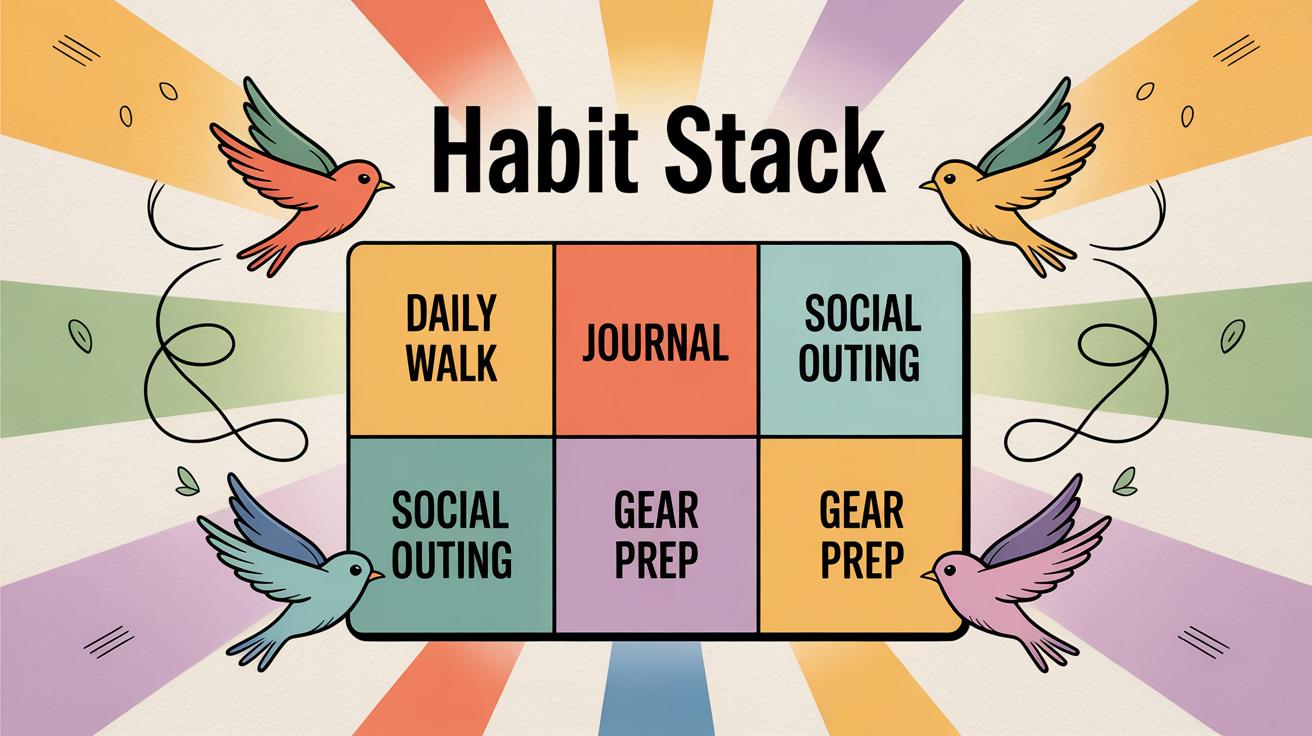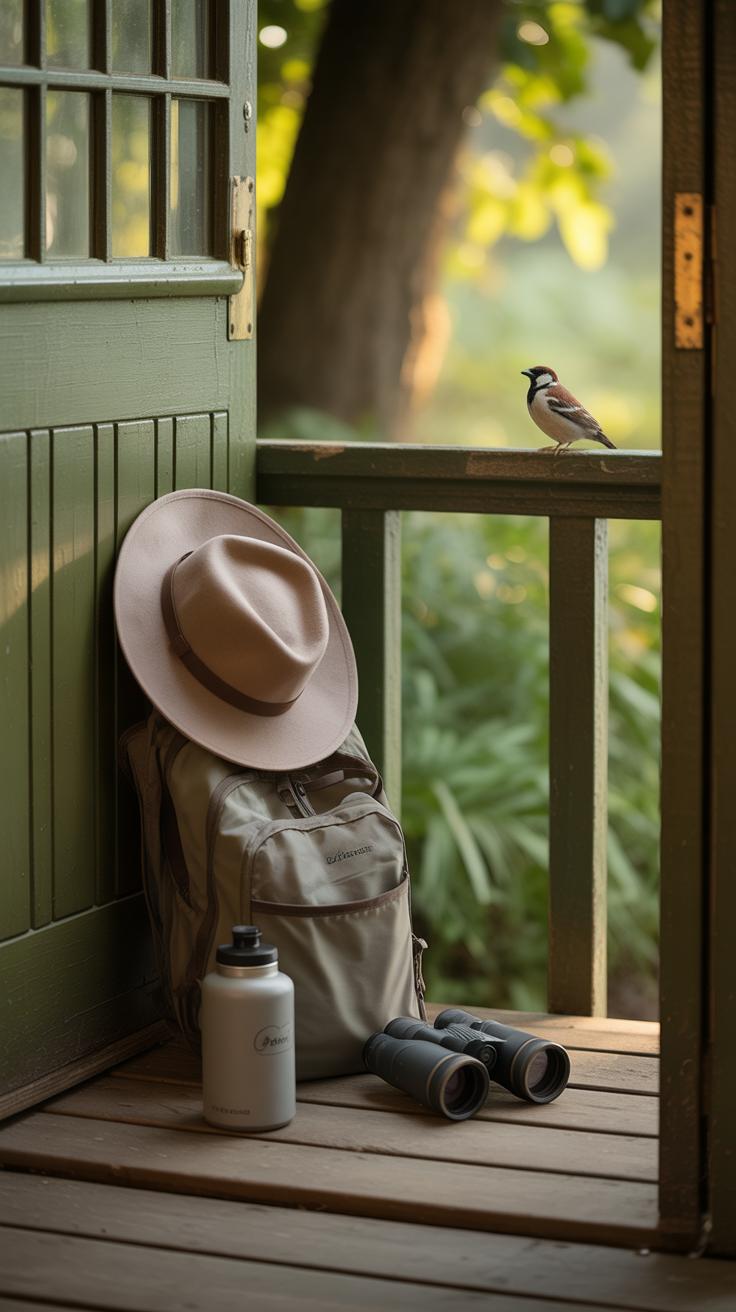Introduction
Bird watching habits can play a strong role in building good mental health. When you watch birds, you connect with nature, which helps calm your mind and body. This simple hobby encourages you to focus on the present moment, making stressful thoughts fade. People who watch birds often find relief from daily worries.
In this article, you will learn about the many ways bird watching helps your mental well-being. We will explore how it improves your mood, sharpens your mind, and brings peace. Follow along to discover how watching birds can brighten your days and strengthen your mental health.
Bird Watching as a Stress Reduction Tool
When you’re feeling overwhelmed, bird watching can offer a simple way to step back from the noise of everyday life. Watching birds often pulls your attention away from worries and onto something peaceful and natural. That shift can really ease stress, even if it’s just for a few moments.
One reason this works is because bird watching gives your mind a gentle break. Instead of ruminating on problems or checking your phone repeatedly, you’re focused on spotting details—the colors of feathers, the way a bird moves, or its song. This kind of soft engagement lets your brain stop churning over stressful thoughts.
Imagine a day when everything feels too much. You might only spend ten minutes outside watching birds in a park or your backyard, but those minutes can change your mood. You may feel a little lighter or more balanced afterward—like you’ve had a chance to breathe deeply and reset, even without meaning to.
Some people find that bird watching creates a safe, soothing routine. When stress strikes, they turn to the familiar calm of nature and bird activity. It’s not about escaping problems, exactly, but more about giving your brain space to relax before tackling challenges again.
Have you noticed how difficult it can be to worry when you’re really focused on something else? Observing birds requires attention, so it can quietly nudge your mind away from stressful loops. That break helps reduce tension and, over time, might make handling stress easier overall.
How watching birds lowers stress hormones
When you focus on birds, your body actually reacts in a way that lowers stress hormones like cortisol. It’s quite fascinating. Just a few minutes of watching birds can help calm your nervous system, making your heart rate slow down and your breathing become steadier. The way your attention shifts from worries to the simple act of noticing a bird’s movement or song interrupts the stress cycle.
For example, I’ve noticed that watching a sparrow hop around the garden makes my thoughts less chaotic. My body stops reacting as if it’s under threat. This isn’t just a guess—studies show that spending time observing nature, birds included, reduces cortisol levels, which means less stress.
Easy ways to incorporate bird watching into your daily routine
Adding bird watching to your day doesn’t need to be complicated or take hours. You could:
- Spend five minutes looking out the window first thing in the morning to spot any birds nearby.
- Take short breaks during work to glance outside or step onto a balcony if you have one.
- Carry a small pair of binoculars and check a park or garden during your lunch hour.
- Try to identify the birds you see, which adds focus and can distract from stressful thoughts.
These moments don’t have to feel like a chore. They can be little pockets of calm, almost like pressing pause on stress. It might seem trivial at first, but giving yourself this quiet focus can really add up. Have you ever caught yourself calming down just by watching a bird flutter about? That’s no coincidence.
Boosting Mood Through Bird Watching Activities
Spending time watching birds often lifts your spirits in subtle but real ways. When you focus on a bird’s flight or plumage, your mind gets a break from everyday worries. This quiet engagement can ease feelings of sadness or irritability, creating moments of calm and pleasure that you didn’t expect just by looking up at the trees.
Your brain’s reward system seems to respond naturally to these small delights. Seeing birds, especially rare or colorful ones, can trigger the release of dopamine and serotonin. These chemicals help improve mood and create a sense of satisfaction. It’s like your brain gives you a little reward for noticing the simple things, without needing anything complicated.
Take Martha, for example—a woman who started watching birds after losing interest in her usual hobbies. She recalls feeling heavier mentally before, but after a few visits to her local park, she noticed a shift. “It wasn’t instant happiness. More like a softening of my mood,” she said. Or consider James, who found that watching finches in his backyard brought unexpected moments of joy during a rough week at work. Their stories aren’t unique. Perhaps you’ve felt that unexpected ease after watching a bird or two yourself.
How Bird Watching Encourages Mindfulness
What is mindfulness and why it matters
Mindfulness is simply paying attention to what’s happening right now, without judging it. It means noticing sights, sounds, or feelings as they occur, rather than letting your mind run away with worries or distractions. This thoughtful awareness often quiets restless thoughts and helps you connect with your present experience.
Why should you care? Because mindfulness can ease stress and create a sense of calm. Studies show people who practice it tend to feel less anxious and better equipped to handle tough emotions. It’s not about forcing your mind to be blank, but about gently steering it back when it drifts. That little switch from distraction to presence can make a surprising difference.
Using bird watching as a mindfulness practice
Bird watching offers a natural way to practice mindfulness—if you let it. When you focus on spotting a bird or listening to its call, you anchor your attention to the moment. Your mind slows down as you scan for movement or colors, noticing details you might normally overlook.
Try this: find a quiet spot, watch a bird, and really see it—its feathers, how it moves, the way it sounds. If your thoughts wander, just notice that and gently bring your focus back to the bird without fuss. Over time, this habit pulls you into the present.
At times, it can be frustrating when the birds shy away or remain silent. But even that waiting sharpens your patience and awareness. In that way, bird watching mirrors mindfulness—sometimes calm, sometimes challenging, always present.
Social Benefits of Joining Bird Watching Groups
Bird watching can often feel like a solitary hobby, but joining groups turns it into a social experience that genuinely affects mental health. When you watch birds with others, you’re not just sharing a hobby; you’re building friendships. These connections help stave off loneliness, something many people quietly struggle with.
Shared activities like bird watching create a natural way to bond. You don’t have to force conversation. Watching a rare bird or sharing a spotting tip sparks genuine interaction. The focus on birds sometimes makes it easier to open up, especially if you feel awkward in other social settings. That quiet, shared excitement builds a sense of belonging — and that feeling can linger long after the walks end.
If you’re wondering where to find these groups, start locally. Many towns have bird watching clubs that welcome beginners and seasoned birders alike. Public libraries or parks often post notices about meetups. Online, forums and social media groups can connect you with folks nearby or beyond. I remember hesitating before joining at first, unsure if I’d fit in. But the shared interest quickly eased any doubt. Maybe it will for you, too?
Learning and Mental Stimulation Through Bird Watching
When you take time to identify birds, your brain engages in a subtle but continuous workout. It’s not just about spotting a bright flash of color or a quick movement; you’re piecing together clues—wing shape, song, habitat. This kind of mental puzzle keeps you focused. You might forget where you put your keys, but remembering the difference between a sparrow and a finch somehow sticks better.
Recognizing different species stretches your memory and attention in ways many activities don’t. At first, it might feel overwhelming—so many birds with slight variations, fleeting appearances—but over time, your mind sharpens. You start to notice patterns, even anticipating where the next sighting could be. This ongoing challenge hones your observation skills, making you more aware not only of birds but of the environment as a whole.
Bird watching also serves as a gentle brain exercise. Just a few minutes trying to recall a bird’s call or marking details in a notebook creates new neural pathways. For some, this slow mental stimulation helps fend off the sluggishness that can come with aging or stress. It might not replace a crossword puzzle, but it certainly offers a fresh way to keep your mind active. Could watching a robin in a tree be more than leisure? Perhaps it’s a small safeguard against mental decline, in its own subtle way.
The Role of Outdoor Time in Mental Health
Spending time outdoors while bird watching naturally draws you into a different rhythm. The mix of fresh air and natural surroundings seems to gently ease the mind, even when your thoughts wander or feel restless.
Fresh Air and Sunlight Effects on Mood
Exposure to sunlight triggers the brain to release serotonin, which can lift your mood or calm feelings of anxiety. It’s not just about feeling warmer or squinting against the sun—it’s actually altering brain chemistry in subtle ways you might not notice immediately.
Fresh air, too, plays its own quiet role. When you breathe deeply among trees or open fields, your body gets a break from the recycled, stale air found indoors. That extra oxygen can help clear your head. You might find yourself thinking more clearly or simply feeling less weighed down.
Movement and Gentle Exercise from Walking to Watch Birds
Walking while searching for birds offers more than just an excuse to get outside. The pace is usually gentle but steady, perfect for allowing your body to move without strain. This light exercise encourages the release of endorphins—those feel-good chemicals that can ease stress and lift spirits.
Even short walks can interrupt cycles of worry or rumination. Your muscles engage, your breathing deepens, and your senses stay alert, all of which can slowly nudge the mind away from distractions or negative thoughts.
Have you noticed how a simple stroll to a favorite birding spot can alter your mood by the time you return? It suggests something about the link between movement, nature, and your overall mental balance.
Creating a BirdFriendly Space at Home
Making your home a welcoming spot for birds isn’t complicated. A few simple touches can bring birds right to your window, letting you enjoy their presence without leaving your space. It might sound obvious, but feeding is one of the easiest ways to attract them—think about putting out a feeder with seeds suited for local birds, like sunflower or nyjer seeds. You can even try a mix; sometimes unexpected favorites show up.
Planting native shrubs and flowers also draws birds because they offer food and shelter. If you have room, consider trees or bushes that produce berries or nuts. These create a natural buffet. And then, water—birds need fresh water for drinking and bathing. A shallow birdbath or a small fountain can make a big difference. Just make sure to keep the water clean.
Watching birds from home has its perks beyond convenience. Having that little burst of nature close by gives your day a calming break. It’s almost like a mini reset—spotting a hummingbird or a robin can lift your spirits fast, even on tough days. Sometimes, I’ve noticed, the simple act of watching birds helps me slow down when everything feels like it’s moving too fast.
Starting Your Bird Watching Habit Today
Getting into bird watching doesn’t require much gear or special experience. You can start with just a pair of binoculars—something simple, not too expensive. Even a smartphone camera helps if you want to snap quick photos of birds you spot. There are plenty of apps that make identifying birds easier, like Merlin or Audubon. They even offer bird calls, which you might find useful as you get more curious about what you’re hearing outside.
Setting small goals makes this habit stick better, I find. For example, aim to spot three different bird species this week, or identify one new call. Writing these down in a journal keeps you connected, especially when life feels chaotic. Note what you see, how you feel during the watching, and maybe even the weather. Sometimes those little details make you realize bird watching isn’t just about birds—it’s about moments of calm and noticing life around you.
Will you try tracking your progress? It can be rewarding to flip back through your notes and see patterns or changes. Plus, a journal gives you space to reflect honestly, without pressure. Bird watching gets easier—and more personal—the longer you do it.
Conclusions
Watching birds offers a unique chance to improve your mental health in easy and natural ways. It invites you to slow down and enjoy the world around you, which helps ease anxiety and boosts happiness. By paying attention to birds, you invite calm and clarity into your life.
Remember, you do not need to travel far or have special tools to start bird watching. Simply observing birds in your backyard or local park can bring noticeable mental benefits. Give it a try and notice how your mood and mind grow stronger each day.




















